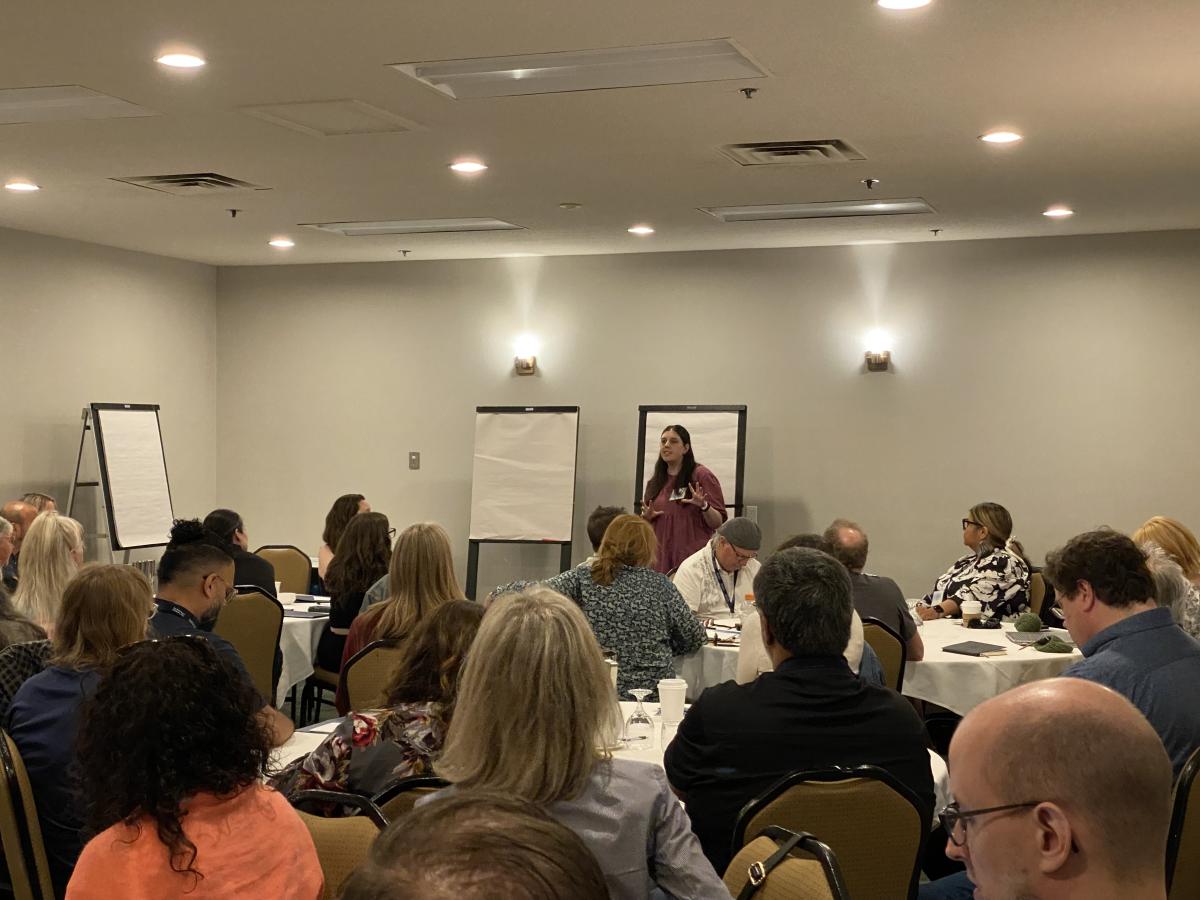July 4, 2024
 At this year’s OP Spring Retreat in Huntsville, we held a professional development session on Slow Touring with Ceilidh Wood. This session was an opportunity for us to share about our ongoing Slow Touring project and get our community thinking about different approaches to touring that are healthier, kinder and more sustainable. The discussions we had highlighted the importance of collaborative, reciprocal relationships between artists and presenters, and that taking the time to have meaningful communication before, during and after an engagement is a key way that we can improve the touring and presenting experience for everyone.
At this year’s OP Spring Retreat in Huntsville, we held a professional development session on Slow Touring with Ceilidh Wood. This session was an opportunity for us to share about our ongoing Slow Touring project and get our community thinking about different approaches to touring that are healthier, kinder and more sustainable. The discussions we had highlighted the importance of collaborative, reciprocal relationships between artists and presenters, and that taking the time to have meaningful communication before, during and after an engagement is a key way that we can improve the touring and presenting experience for everyone.
As a part of the workshop, we explained the 5 principles underpinning OP’s Slow Touring Project:
- Equity (including for Indigenous, people of colour, women, deaf and disabled, queer, trans and non-binary, elder, emerging, and caregiver artists and artworkers)
- Ensuring meaningful connections between artists and the communities they visit
- Addressing the power imbalance between artists and presenters
- Climate justice and sustainability
- Mental and physical wellness of artists and artsworkers
Attendees then dove into discussions about what actions, however small, would help support these principles and incorporate further them into our work. Some of the ideas and suggestions that came from these discussions included:
- Revisiting the default show day schedule - how can we make this easier on people? (e.g. an artist getting to check into their hotel before sound check, or having access to a “nap room” at the venue)
- Put more into your rider - artists should feel empowered to ask for things they need, not just technically but personally and socially as well (one example was touring Indigenous artists requesting that they be connected to the local Indigenous community)
- Presenters collaborating to make more efficient routes for tours (thankfully this is already a important feature of OP’s block booking program)
- Measuring success differently, perhaps over a longer period of time
- More meaningful communication between artist and presenter, for example integrating the artist further into the marketing process
- Providing healthy food for visiting artists
- Making venue more psychologically accessible to people who may not normally attend (e.g. it may be physically accessible to someone with a mobility device, but do they feel welcome? Can they access performances that tell disabled stories? Do they see disabled people represented on staff)
- Going out and hosting events in other locations in the community to increase access and connection
- When interpersonal issues arise, try talking face to face and being understanding of the stress that touring can place on individuals
- Don’t be afraid to follow up and give feedback (compassionately) to collaborators on how things went, rather than thinking “that went badly, I’ll never work with them again” but not sharing why.
Ultimately, so many of the ideas we discussed were about strong communication between artists and presenters. Our research has shown that artists often perceive a power imbalance between themselves and the presenters, and they don’t always feel empowered to actually ask for the things they need. Creating a generous, reciprocal relationship can support artists in communicating their needs, whether it is a healthy meal, an early-check in, access to a local amenity, or any kind of accessibility need. This supports artists in doing their best creative work, which is of course is why we’re all here!
We are already starting to see examples of different kinds of riders, such as the Accessibility Rider’, or Decolonization Rider’. Presenters should prepare to see more of these in the future, and I want to encourage presenters to be open to these requests, and of course don’t be afraid to start a conversation when you can’t accommodate a specific request - artists should also be prepared to be flexible and find solutions collaboratively when certain amenities aren’t available.
I strongly encourage everyone to invest time in meaningful conversations in advance of and following a presentation. Every person, venue, and community is unique and the best engagements come from acknowledging and supporting those unique needs and features.

